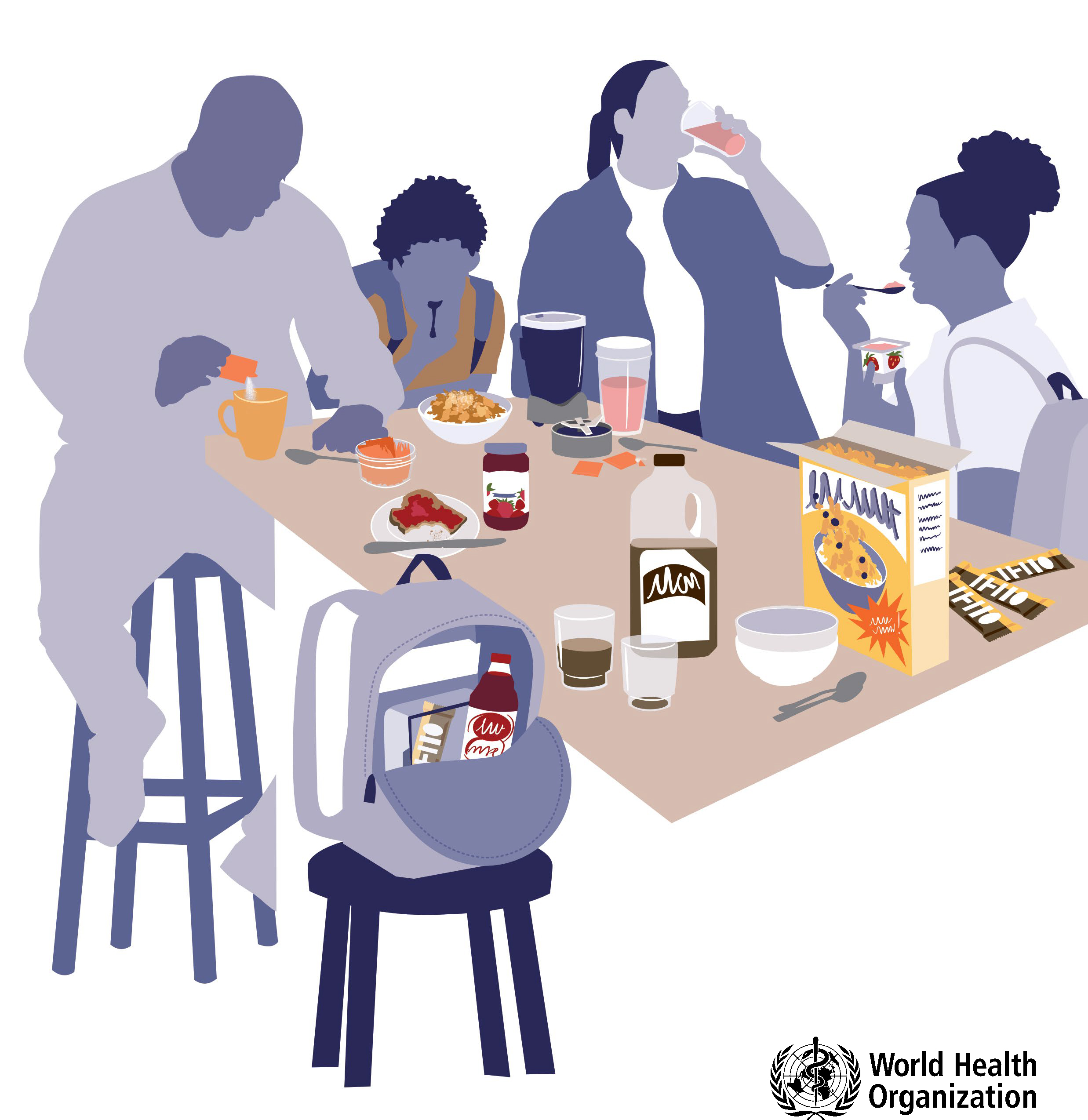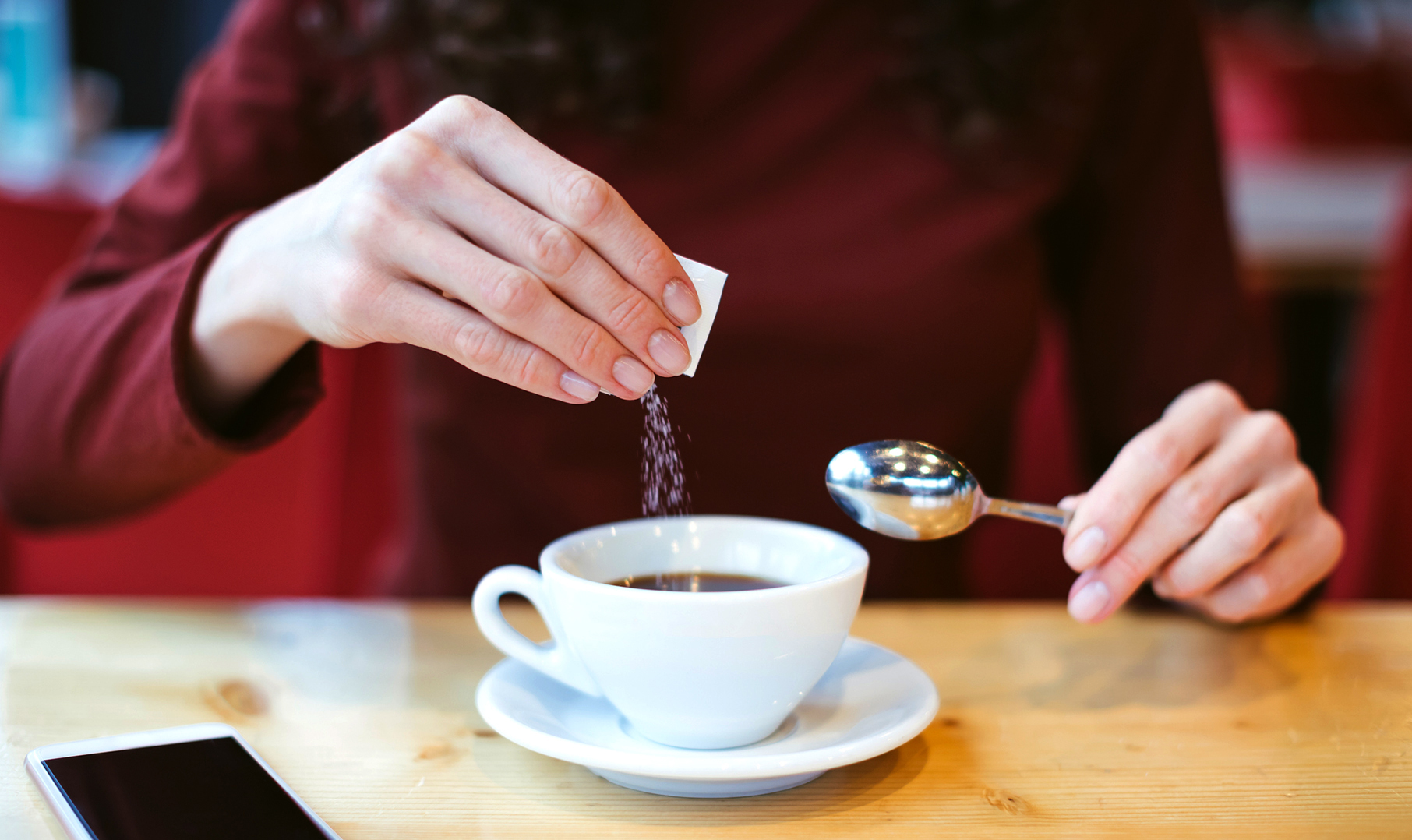“Artificial sweeteners”, “non-nutritive sweeteners”, “sugar substitutes”, “no-calorie sweeteners” — call them what you will, the World Health Organization is advising you not to use them if you want to lose weight for the long term and minimise your risk of getting diabetes and heart disease.
This is the bottom line of WHO’s now-finalised guideline on the use of non-sugar sweeteners (NSS), in which it cautions governments and individuals that “non-sugar sweeteners not be used as a means of achieving weight control or reducing the risk of non-communicable diseases”. Non-communicable diseases are the leading cause of death globally, WHO says, responsible for an estimated 41 million (74%) of the 55 million deaths globally in 2019.
The analysis of more than 160 studies from more than 30 countries that WHO reviewed as the evidence base for the guideline found “no evidence of long-term benefit” of using non-sugar sweeteners on body weight in adults and children, and that long-term use of non-sugar sweeteners raised the risk among adults of obesity, type 2 diabetes, some cardiovascular diseases, and mortality. Among pregnant women, their evidence pointed towards a 25% higher risk of pre-term delivery with the consumption of non-sugar sweeteners during pregnancy.
As Daily Maverick reported in February, the results of the review are a dramatic departure from decades of received public-health wisdom that advocated for replacing sugar with sugar substitutes which, it was thought, had no effect on blood sugar.
“The assumption had been that they are inert and pass right through the gastrointestinal tract but now we see that may not necessarily be true,” said Dr Jason Montez, a scientist in WHO’s Department of Nutrition and Food Safety who led the systematic review that formed the basis for the new guidelines. “Anything that tastes sweet is interacting with the same sweet-taste receptor,” Montez told Daily Maverick, explaining that these receptors are not just in our mouths, but also in other “glucose-sensing” cells of organs such as the gut and pancreas.
“When you get accustomed to a high level of sweetness in the diet it’ll inevitably lead to an increase in consumption of highly processed foods with added sugars and non-sugar sweeteners — so one way of improving your diet is to reduce the overall sweetness,” he said.
 WHO analysis found “no evidence of long-term benefit” of using non-sugar sweeteners on body weight in adults and children, and that long-term use of non-sugar sweeteners raised the risk among adults of obesity, type 2 diabetes, some cardiovascular diseases, and mortality. (Photo: iStock)
WHO analysis found “no evidence of long-term benefit” of using non-sugar sweeteners on body weight in adults and children, and that long-term use of non-sugar sweeteners raised the risk among adults of obesity, type 2 diabetes, some cardiovascular diseases, and mortality. (Photo: iStock)
The devil in the detail
The review on which WHO based its new recommendation looked at evidence from three different types of studies: 45 short-term clinical trials (mostly 3 or 6 months), and 120 long-term ‘observational’ studies (64 among adults, 15 among children, and 41 ‘case-control’ studies specifically on cancer outcomes). The studies came from a wide range of countries, including Australia, France, Mexico, the United States, the United Kingdom, Norway, Slovenia, Denmark, Serbia, Lebanon, Japan, India and one (on children) from South Africa.
Among the observational studies, which simply observe what people do naturally over time (compared to clinical trials, where they are told to do or not do something in the short term) the WHO researchers established results for health effects including body weight, body mass index (BMI), obesity, type 2 diabetes, ‘all-cause mortality’, cardiovascular-disease mortality, cancer mortality, and cancer occurrence, among others.
Across all the studies, different sweeteners used included aspartame, saccharin, stevia, sucralose, acesulfame-K, and in some an unspecified mix of non-sugar sweeteners.
The results focused on body weight, and non-communicable diseases and mortality.
While WHO’s analysis found that at the end of short-term clinical trials, the people consuming more non-sugar sweeteners did have lower body weight and lower BMI than people consuming less of them or none. But the longer-term observational studies examining people’s real-world behaviour over time showed that higher intakes of non-sugar sweeteners were associated with a higher BMI, and a 76% increased risk of obesity.
They also showed that higher intakes of non-sugar sweeteners were associated with a 23% to 34% increase in the risk of developing type 2 diabetes. These higher intakes over time were also linked to a 32% greater risk of cardiovascular disease, including stroke (19% increase) and hypertension or high blood pressure, known to be a precursor to stroke (13% increase).
There was no association of higher intakes of non-sugar sweeteners with coronary heart disease (one type of cardiovascular disease), chronic kidney disease or overall cancer diagnoses, though there was an increased risk of bladder cancer with higher intakes of mainly saccharin-containing sweeteners.
Why now?
WHO says it decided to look into non-sugar sweeteners now because of increased interest from countries in whether their policies to reduce “free sugars” should include non-sugar sweeteners — following WHO’s 2015 guidance to limit the consumption of “free sugars” to less than 10% of daily energy intake, and preferably 5% (the equivalent of 6 teaspoons of sugar).
At the same time, the use of non-sugar sweeteners by consumers and by food-and-drink manufacturers globally has increased — often in ways that are hidden. In South Africa, the use of non-sugar sweeteners in historically sugar-sweetened beverages such as colas and mixers like ginger ale and tonic water, has exploded since the 2018 introduction of the “sugar tax”. Beverage manufacturers reduced the sugar content of drinks in order to reduce their tax liability — but they have replaced some of the sugar with non-sugar sweeteners instead. The result is that these hugely popular drinks now contain both sugar and non-sugar sweeteners, both of which increase the risks of long-term weight gain, type 2 diabetes, hypertension and cardiovascular diseases.
 Across all the studies, different sweeteners used included aspartame, saccharin, stevia, sucralose, acesulfame-K, and in some an unspecified mix of non-sugar sweeteners. (Illustration: The World Heath Organisation)
Across all the studies, different sweeteners used included aspartame, saccharin, stevia, sucralose, acesulfame-K, and in some an unspecified mix of non-sugar sweeteners. (Illustration: The World Heath Organisation)
Will South African manufacturers change what’s in our drinks?
Matlou Setati, Executive in the Food Safety and Sustainability Initiative of the Consumer Goods Council of South Africa (CGCSA) commented to Daily Maverick that the CGCSA “has noted the release by the WHO of a new guideline on the use of Non-Sugar Sweeteners (NSS),” acknowledging that “the guideline is part of a suite of existing and forthcoming guidelines on healthy diets aimed at establishing lifelong healthy eating habits, improve dietary quality, and decrease the risk of Non-Communicable Diseases (NCDs) worldwide, including in South Africa.”
Setati said that the guideline “comes at an important time,” referring to the Department of Health’s current review of legislation under the Foodstuffs, Cosmetics and Disinfectants Act (specifically the new draft regulations on front-of-pack labelling, which mandates warning labels for foods and drinks containing “artificial sweeteners”, as well as for those high in sugar, salt and unhealthy fats).
“The CGCSA has been working with its food and beverage member companies on offering healthier food options in support of the Department of Health’s strategy to reduce the incidence of NCDs,” Setati said via email. “We will work with the department to ensure we have regulations that will take the country forward in terms of supporting efforts to reduce NCDs through the provision of healthy food options in the context of rising food insecurity.”
What happens next?
Since WHO’s completion of its review in July 2022 for the new guideline, more research on non-sugar sweeteners has emerged, potentially strengthening WHO’s case for limiting our use of them.
One in particular, published in August 2022 by a team of researchers from Israel’s Weizmann Institute of Science, looked at why non-sugar sweeteners might cause metabolic changes. Their clinical trial examining the blood-sugar and metabolic effects of four different non-nutritive sweeteners — aspartame, stevia, sucralose and saccharin — showed that all four sweeteners caused changes to “the composition and function of gut microbes and the molecules they secrete into peripheral blood,” lead researcher Professor Eran Elinav said.
Though WHO was not able to include in its review studies that had been released since July 2022, Montez said, “We are well aware of the research into non-sugar sweetener (NSS) effects on the microbiome and note this in the guideline as one of several proposed mechanisms for the possible observed effects of NSS on health. It’s a very interesting, but complex area of research and there is still much to learn about how NSS might lead to health effects via changes in the microbiome.”
Montez also emphasised that WHO is working towards “developing clear messaging on what to eat that brings together all WHO guidance. Our goal is to improve overall dietary quality in many ways,” he said. “Non-sugar sweeteners are just one piece of the puzzle.
“Even though sugar intake has gone down recently in many parts of the world, there’s good evidence to suggest that overall sweetness is going up as indicated by the large number of foods and beverages containing added sugars, NSS or both,” Montez told Daily Maverick, “so we are trying to communicate the message that maybe it’s time to tone down the overall sweetness of the diet. There’s certainly room to dial it back in many cases.”
Montez says this is especially critical for children, especially when in some countries more than half of what we eat are processed foods — and it’s not just the blatantly obvious sugary cereals in the spotlight. Processed foods often have ‘hidden’ sweeteners: soups, stews, pizza, salad dressings, chips — to name a few. “We are concerned about children becoming accustomed to a really sweet diet at an early age, because that’s when taste preferences are formed. If you get used to such a diet as a child it’s really tough to make dietary changes as you get older.”
In terms of individuals’ choices about adding sugar to what they eat, Montez re-emphasises that WHO’s point is to help people embrace healthier eating overall. “While we do recommend limiting intake of sugars, we’re not saying people can’t have any sugar. If you’re able to completely eliminate added sugars from your diet that’s great. If not, a conscious effort should be made to limit added sugars intake as much as possible — without the use of NSS — by treating sweet foods as exceptions in the diet rather than the rule, and scanning nutrition labels for “hidden” added sugars.”
In response to the WHO guideline, on May 17 renowned epidemiologist Professor Tim Spector, author of Food for Life, tweeted: “Finally after many academic papers warning of the lack of benefit of artificially sweetened drinks & foods & plenty of evidence of harm — the WHO is the first official body to warn us! Hopefully this is the tipping point in the fight against fake food.” DM
Notes:
- WHO’s recommendation applies to all people except those with pre-existing diabetes (mainly because the studies included in WHO’s review did not include groups with diabetes so the results technically do not apply to them).
- The recommendation includes all synthetic and naturally-occurring or modified non-nutritive sweeteners that are not classified as sugars, including acesulfame K, aspartame, advantame, cyclamates, neotame, saccharin, sucralose, stevia and stevia derivatives.
- The recommendation does not apply to personal-care products containing non-sugar sweeteners (toothpaste, skin creams, medications) or to low-calorie sugars and sugar alcohols (polyols).
Adèle Sulcas writes about food, health and science for Daily Maverick, and is consulting editor to the SAMRC Centre for Health Economics and Decision Science (Priceless SA) at the University of the Witwatersrand.




 Across all the studies, different sweeteners used included aspartame, saccharin, stevia, sucralose, acesulfame-K, and in some an unspecified mix of non-sugar sweeteners. (Illustration: The World Heath Organisation)
Across all the studies, different sweeteners used included aspartame, saccharin, stevia, sucralose, acesulfame-K, and in some an unspecified mix of non-sugar sweeteners. (Illustration: The World Heath Organisation) 